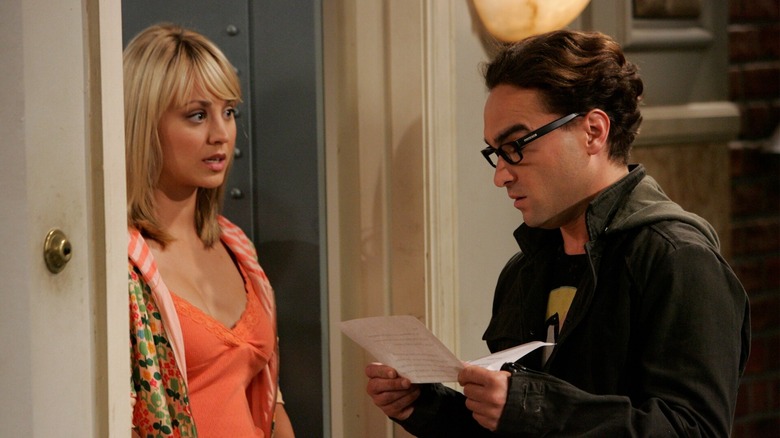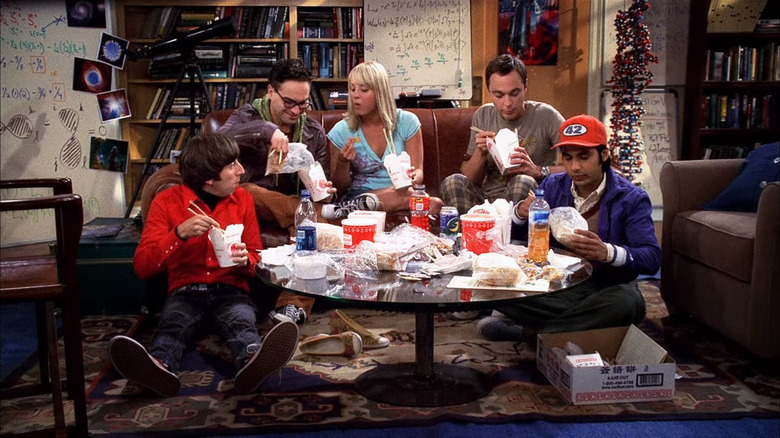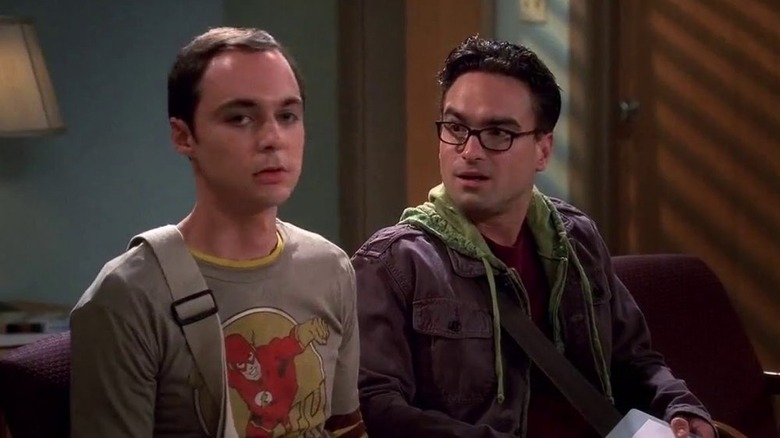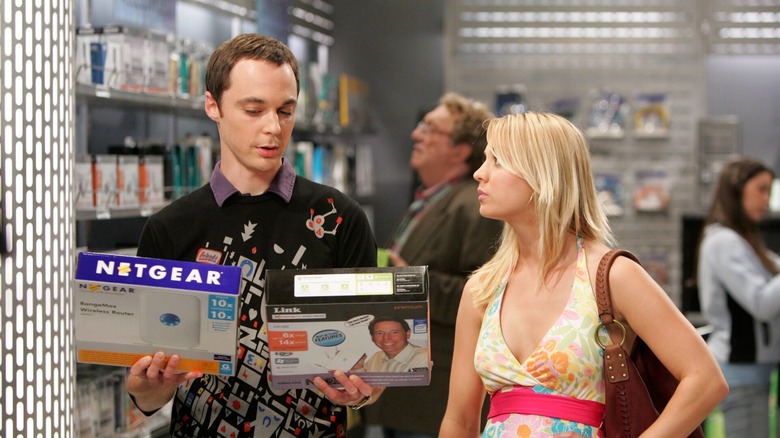The Big Bang Theory Season 1's Rotten Tomatoes Score Reveals A Surprising Truth
So what is that truth? Well, people don't totally love the first-ever season of "The Big Bang Theory."
Obviously, things worked out in the end, and the Chuck Lorre sitcom became one of the biggest shows in recent memory. As it turns out, though, the initial outing didn't exactly charm critics. Over on Rotten Tomatoes, Season 1 of "The Big Bang Theory" has a pretty dismal 59% rating, which officially classifies it as "rotten." So what went wrong here, and how did the show manage to stick around and earn piles of Emmys?
The critical consensus for Season 1 reads, "The Big Bang Theory brings a new class of character to mainstream television, but much of the comedy feels formulaic and stiff," and the reviews definitely back that up. Writing for The A.V. Club at the time, Scott Tobias said, "It's hard to believe that anyone's even making a three-camera sitcom this mothballed." Alan Sepinwall, who worked for the Newark Star-Ledger then, wrote, "It wasn't like the storyline was remotely funny enough to justify that stupidity." After saying he gave the show an "honest shot," Dustin Rowles at Pajiba concluded, "But I don't care how many references to Comic-Con 'The Big Bang Theory' makes, it's not a good show, geek, nerd, or otherwise." These are some pretty harsh words for the then-fledgling comedy ... but clearly, it managed to overcome its hurdles.
There's actually an abandoned original pilot for The Big Bang Theory
The strangest part of "The Big Bang Theory's" poorly reviewed first season is that the pilot seen — and panned — by critics was actually the show's second crack at the project. Famously, there's a very different pilot of "The Big Bang Theory" — one that doesn't feature Kaley Cuoco's Penny and one that has a very different feel from the show that fans and critics alike later ended up totally loving.
First off, this pilot centers around Sheldon Cooper (Jim Parsons) and Leonard Hofstadter (Johnny Galecki) teaming up to donate sperm to a local sperm bank, something which feels impossible to imagine when you consider the character Sheldon later became. Stranger still, Sheldon spends a decent amount of the episode leering at a magazine featuring scantily clad women, a thing the later version of Sheldon would never, ever do. Worst of all, though, was the lack of Penny; without Cuoco, the character was played by Amanda Walsh and was named Katie, and to say she was acerbic and biting is an understatement. Penny definitely makes fun of the boys, but there's a sweetness to her that was lacking in the way Katie was written ... ultimately, changing up the entire premise was a good choice. Sure, this still didn't mean Season 1 was perfect, but it definitely could have been a lot weirder and worse.
Clearly, things improved for The Big Bang Theory over time
Obviously, things got better for "The Big Bang Theory," and by Season 2, its Rotten Tomatoes score had skyrocketed from that dismal 59% all the way to 100%. Thanks to the central performances of Jim Parsons, Johnny Galecki, Kaley Cuoco, Kunal Nayyar, and Simon Helberg — the last two of whom played Raj Koothrappali and Howard Wolowitz, respectively — the show ended up winning audiences over, and Season 3 followed suit, also earning a perfect, fresh 100% rating.
That's not to say that viewers think it was perfect all the way through; there were definitely dips in quality throughout the years. Season 4 went down to 80%, though the critical consensus specifically shouted out Mayim Bialik joining the cast as a positive move. Season 1 still boasts the all-time lowest rating, but Seasons 6, 8, and 9 all scored 67%, while Season 11 earned 75%. (This doesn't come as a total surprise, considering that the series' worst episodes as ranked by IMDb are pretty much exclusively from later seasons of "The Big Bang Theory.") Still, it was a resounding success when all was said and done, and it clearly surpassed its stumbles in Season 1.
How long did The Big Bang Theory end up running — and did it overstay its welcome?
When all was said and done, "The Big Bang Theory" ran for a whopping twelve seasons, and Mayim Bialik wasn't the only new addition that livened up the show; she was joined by Melissa Rauch as the brilliant microbiologist Bernadette Rostenkowski, who eventually marries and settles down with Simon Helberg's Howard. (Bialik plays Amy Farrah-Fowler, a neuroscientist who tames and marries Sheldon Cooper.) Giving Penny people to hang out with besides a bunch of socially inept nerds was definitely the shot in the arm the show needed, and once everybody was paired up, the show set up its final act when Parsons elected to not return for a thirteenth season.
In the final season, Sheldon and Amy receive a nomination for a Nobel Prize for their research into super asymmetry — and eventually win, with the rest of the gang joining them in Stockholm when they receive the honor. Despite apparently not wanting kids, Penny and Leonard are expecting a baby. Howard and Bernadette have two tykes of their own, and Raj is, uh, just sort of there as well.
You can stream all of "The Big Bang Theory" on Max now.



